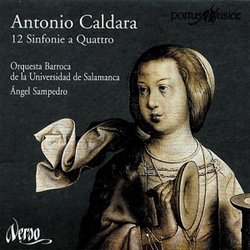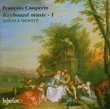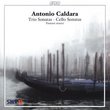| All Artists: ángel Sampedro, Baroque Orchestra of Univeristy Slamanca Title: Antonio Caldara: 12 Sinfonais a Quattro Members Wishing: 1 Total Copies: 0 Label: Verso Original Release Date: 10/30/2006 Release Date: 10/30/2006 Genre: Classical Styles: Historical Periods, Baroque (c.1600-1750), Symphonies Number of Discs: 1 SwapaCD Credits: 1 |
Search - ángel Sampedro, Baroque Orchestra of Univeristy Slamanca :: Antonio Caldara: 12 Sinfonais a Quattro
 | ángel Sampedro, Baroque Orchestra of Univeristy Slamanca Antonio Caldara: 12 Sinfonais a Quattro Genre: Classical
|
Larger Image |
CD DetailsSimilar CDs |
CD Reviews”Viva Salamanca! ”Viva! Giordano Bruno | Wherever I am, I am. | 03/26/2010 (5 out of 5 stars) "The twelve 'sinfonie' recorded here were composed between 1718 and 1735, during the years when Antonio Caldara served the Hapsburg emperor Charles VI in Vienna. Caldara was merely 'second fiddle' in the musical hierarchy, officially the assistant of JJ Fux, but he was extremely well paid and he earned his salary with a prodigious output of music, especially operas and oratorios. Charles VI was reputed to have 'old-fashioned' tastes, preferring the complex intellectual tangle of counterpoint to the newer galante style. But he was lavish in his support of music, maintaining an orchestra of up to 36 players for workaday performances. Thus the title "Sinfonie a Quattro' is misleading; Caldara probably conceived these pieces for an orchestra of the size that performs them on this CD, the twenty-two instrumentalists of the Orquesta Barroca of the University of Salamanca, chiefly students at the second oldest university in all of Europe. The sound they produce is truly symphonic. They sound more like what a listener might expect from an orchestra of 1780 than of 1718, and the music itself sounds more like Haydn or one of his contemporaries than like anything else of the mid-baroque.
Forward looking these three- or four-movement symphonies may sound, but they are not intended to be profound. They are essentially "pure" music for aristocratic entertainment. Anyone seeking profundity should look to Caldara's oratorios, several of which have been brilliantly recorded. Musically, nevertheless, they are startlingly innovative for their times, with daring usage of chromatic scales and abrupt modulations. One can't help but think that they were important starting points for the evolution of later 18th C classical forms, the multi-movement symphony, the orchestral sonata, and the string quartet. Whatever their historical role, however, they are richly various listening pieces, dramatic and robust. The Orquesta Barroca of Salamanca, founded in 1990, plays entirely on period instruments. This recording was made in 2001, during my own tenure at the University. Just as an aside, let me say that Salamanca was an opportune haven in September of 2001, a world apart from modern times, a well-preserved baroque city with automobiles excluded from its center and with busts and statues of historical worthies everywhere, all of whom seemed to nod sympathetically at me during the hours of "paseo". The University has a glorious music program and sponsors concerts by notable ensembles from all of Europe, some of them in the massive beautiful baroque cathedral. There are dozens of 'immersion' Spanish classes offered in the summer, and traditional/folk/flamenco music resounds in the Plaza Mayor, the finest in all Europe, almost every night. Tourist who go to Spain only for Andalucia and the Costa Brava make a huge mistake; upper Castile is the 'real' Spain. Within day-trip range of Salamanca, one can see the whole Iberian history in gorgeous sites: from an intact Visigothic church to architecture by Gaudi, with some of the finest "Moorish" artifacts, the convent refuge of Juana la Loca, Avila where Santa Teresa lived, Segovia, the city of Saint John of the Cross and possibly the most picturesque city in Europe, plus the 'white villages' of the Sierra del Gredo. But back to the music: this CD goes in and out of availability inexplicably. Get it while you can!" |

 Track Listings (40) - Disc #1
Track Listings (40) - Disc #1
